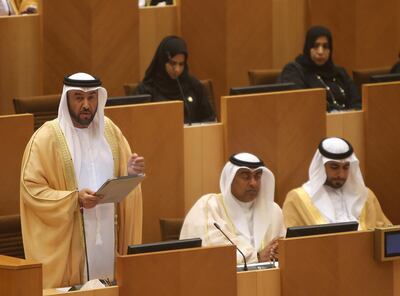Emiratis on university scholarships abroad have seen their financial allowances drop, members of the Federal National Council have claimed, as they urged the government to give higher payouts to students.
At a debate late on Tuesday evening, representatives said stipends have dropped twice since 2016, further compounded by rises in inflation and the rising cost of living in places like Europe.
Khalid bin Zayed Al Falasi, who represents Dubai, told the chamber that in the past two years there has been a 30 per cent drop in what is paid out to students on government scholarships by the Ministry of Higher Education.
“There have been two phases of reductions: first the allowances dropped from €4,000 (Dh17,000) per month to €3,000 (Dh12,800), and now it has reached €2,800 (Dh11,900).”
He said most of the allowance goes on rent and living costs, “and they are only left with 300," per month.
Mr Al Falasi sent questions to Minister of State for Higher Education Dr Ahmad Al Falasi ahead of the session.
“Many UAE nationals who have been sent to study abroad are complaining about the cuts, and it has affected their lives negatively," the FNC member said.
He gave the example of an Emirati medicine student in Ireland, whose father, he said, sent documents from 2016, 2017 and 2018, to show the pattern of reductions.
“Students should not be affected by those cuts, they are residing outside the country and away from their homes and families. Also inflation should be taken into consideration," the Dubai representative said.
“Half of the stipend is going towards rent,” he added, “and they have other supplies they need to buy on a day-to-day basis, especially for women.”

Minister Dr Al Falasi did not attend the session on Tuesday evening, but sent a written response to say that the issue is already under consideration.
He also said allowances have dropped in real terms due to fluctuations in the currency rate.
But FNC council members said they were unconvinced and they raised an official recommendation, calling on the government to raise the stipends again, and compensate students for the drop seen since 2016.
“The reason for the reductions was not clear,” said Dubai representative Mr Al Falasi.
Ismail Ahmad and Rashid Omar are Emiratis studying business administration in the UK.
They told The National that they are not personally affected, but that the allowance varies considerably, depending on the type of scholarship.
They said the ministry scholarship leaves students they know with very little left at the end of the month, whereas the stipend from the Crown Prince Court is generous.
______________
Read more:
Number of UAE students studying in US drops by almost 10 per cent
UAE cities among best for student experience but held back by high costs
UAE visas changes: Five-year student visas can re-energise jobs market
______________
"I don’t have this problem because my scholarship is sponsored by the Crown Prince Court, and the stipend is enough,” said Mr Ahmad, 29.
“Also, our allowances were not subject to reductions; those who came after us were and we have seen their experience."
He said a lot of his allowance goes on the decision to live in London and commute to Manchester, where he studies.
"The rent is expensive, the train is expensive, the food, living costs – everything," he said.
“The apartment rent alone is around Dh10,000, and the train ticket is 100 pounds from Manchester to London, so around Dh600. Imagine paying that three times a week, so about Dh6,000 a month only on trains.
“In any country you can find economic options and costly options, but with the affordable options come very poor conditions. You get a room the size of a bathroom."
Mr Omar, 23, who finished his studies this month, suggested those on the ministry's own scholarship system are more affected than he is.
“There was a huge difference between our stipends and theirs," he said.
"We receive about Dh22,000 and they get between Dh12,000 and Dh14,000 [per month].”
They usually resort to staying in university housing to save whatever they can.
“You find many of them without any cash by the end of the month. And during holidays we go out and have fun, and they couldn’t afford to," he said.
“My brother was studying in the US on the Ministry of Higher Education’s scholarship, and his stipend was never enough. My dad had to send him an additional Dh10,000 every month.
“Students on scholarship are not allowed to work, so for any extras, he ended up calling our father or brothers to send him money."







